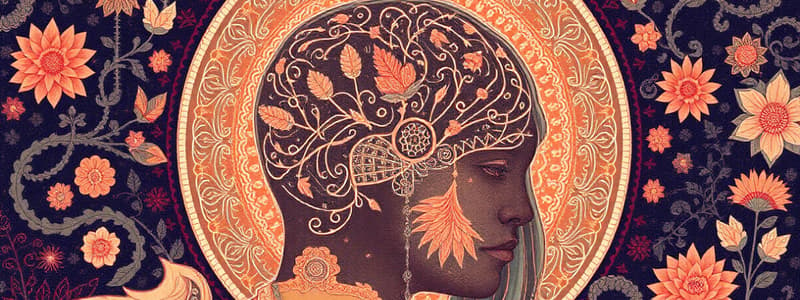Podcast
Questions and Answers
What is the primary motivation for human behavior according to Erikson's theory?
What is the primary motivation for human behavior according to Erikson's theory?
- Achievement of personal goals
- Emotional stability and wellbeing
- Social affiliation with others (correct)
- The pursuit of knowledge and education
Which of the following stages occurs during the age range of 1-3 years in Erikson's psychosocial development?
Which of the following stages occurs during the age range of 1-3 years in Erikson's psychosocial development?
- Autonomy vs. Shame (correct)
- Industry vs. Inferiority
- Trust vs. Mistrust
- Initiative vs. Guilt
In Piaget's stages of cognitive development, which stage is associated with the ability to use logic?
In Piaget's stages of cognitive development, which stage is associated with the ability to use logic?
- Preoperational Stage
- Concrete Operations Stage (correct)
- Sensorimotor Stage
- Formal Operations Stage
At what age range does the 'Ego Identity vs. Role Confusion' stage occur?
At what age range does the 'Ego Identity vs. Role Confusion' stage occur?
Which of the following best describes the focus of the 'Industry vs. Inferiority' stage?
Which of the following best describes the focus of the 'Industry vs. Inferiority' stage?
What is upward comparison in social comparison theory?
What is upward comparison in social comparison theory?
According to Maslow's hierarchy of needs, which stage focuses on providing basic necessities such as food and water?
According to Maslow's hierarchy of needs, which stage focuses on providing basic necessities such as food and water?
Which of the following describes competitive emulation?
Which of the following describes competitive emulation?
What fundamental need is primarily related to feelings of companionship and acceptance?
What fundamental need is primarily related to feelings of companionship and acceptance?
Which type of social comparison involves evaluating oneself against those who are less fortunate?
Which type of social comparison involves evaluating oneself against those who are less fortunate?
What is the first step in the inquiry model?
What is the first step in the inquiry model?
Which of the following best describes the 'stickiness factor'?
Which of the following best describes the 'stickiness factor'?
What is qualitative data primarily concerned with?
What is qualitative data primarily concerned with?
What is a defining feature of flash mobs?
What is a defining feature of flash mobs?
The 'law of the few' suggests that the success of social epidemics relies on which of the following?
The 'law of the few' suggests that the success of social epidemics relies on which of the following?
In the context of Malcolm Gladwell's theories, what role does 'power of context' play?
In the context of Malcolm Gladwell's theories, what role does 'power of context' play?
What does the concept of acculturation refer to?
What does the concept of acculturation refer to?
Which type of data would most likely yield quantitative results?
Which type of data would most likely yield quantitative results?
What is the role of the ego in personality according to the content?
What is the role of the ego in personality according to the content?
Which concept describes the forces that lead to redirecting emotions into substitute targets?
Which concept describes the forces that lead to redirecting emotions into substitute targets?
What does a glass ceiling represent in a societal context?
What does a glass ceiling represent in a societal context?
In psychological terms, what does repression refer to?
In psychological terms, what does repression refer to?
How is the concept of anomie characterized in social situations?
How is the concept of anomie characterized in social situations?
What theory suggests that all societies face challenges posed by both the environment and forces aimed at destruction?
What theory suggests that all societies face challenges posed by both the environment and forces aimed at destruction?
Which theory examines the ways that society maintains stability and social order?
Which theory examines the ways that society maintains stability and social order?
What concept describes the belief among adolescents that they are unique and invulnerable?
What concept describes the belief among adolescents that they are unique and invulnerable?
Who proposed the idea that adolescence involves the development of lasting values?
Who proposed the idea that adolescence involves the development of lasting values?
Which of the following best identifies the primary agent of socialization?
Which of the following best identifies the primary agent of socialization?
What theory discusses the cyclical nature of trends, values, and beliefs within society?
What theory discusses the cyclical nature of trends, values, and beliefs within society?
What is a common characteristic of the conflict theory of change?
What is a common characteristic of the conflict theory of change?
Which socialization agent includes individuals like friends and peers?
Which socialization agent includes individuals like friends and peers?
What does the process of envisioning how we appear to others imply in terms of self-perception?
What does the process of envisioning how we appear to others imply in terms of self-perception?
In Bandura's research on observational learning, what behavior was primarily demonstrated in the Bobo doll experiment?
In Bandura's research on observational learning, what behavior was primarily demonstrated in the Bobo doll experiment?
What did Solomon Asch's conformity studies demonstrate about social pressure?
What did Solomon Asch's conformity studies demonstrate about social pressure?
What is normalization in the context of social phenomena?
What is normalization in the context of social phenomena?
What does the concept of 'global village' refer to?
What does the concept of 'global village' refer to?
Flashcards
Social Paradigm Shift
Social Paradigm Shift
When a new set of ideas, beliefs, and values become so influential that they change how individuals perceive reality.
Evolutionary Theory of Change
Evolutionary Theory of Change
The process by which societies evolve from simple structures to more complex ones.
Cyclical Theory of Change
Cyclical Theory of Change
The idea that trends, traditions, beliefs, and values are cyclical, rising and falling in popularity.
Challenge and Response Theory of Change
Challenge and Response Theory of Change
Signup and view all the flashcards
Functionalist Theory of Change
Functionalist Theory of Change
Signup and view all the flashcards
Conflict Theory of Change - Marx
Conflict Theory of Change - Marx
Signup and view all the flashcards
Adolescent Egocentrism
Adolescent Egocentrism
Signup and view all the flashcards
Personal Fable
Personal Fable
Signup and view all the flashcards
Social Comparison Theory
Social Comparison Theory
Signup and view all the flashcards
Upward Comparison
Upward Comparison
Signup and view all the flashcards
Downward Comparison
Downward Comparison
Signup and view all the flashcards
Competitive Emulation
Competitive Emulation
Signup and view all the flashcards
Maslow's Hierarchy of Needs
Maslow's Hierarchy of Needs
Signup and view all the flashcards
Inquiry Model
Inquiry Model
Signup and view all the flashcards
Flash Mob
Flash Mob
Signup and view all the flashcards
Flash Robs
Flash Robs
Signup and view all the flashcards
The Tipping Point
The Tipping Point
Signup and view all the flashcards
The Law of the Few
The Law of the Few
Signup and view all the flashcards
The Stickiness Factor
The Stickiness Factor
Signup and view all the flashcards
The Power of Context
The Power of Context
Signup and view all the flashcards
Qualitative Data
Qualitative Data
Signup and view all the flashcards
Quantitative Data
Quantitative Data
Signup and view all the flashcards
Acculturation
Acculturation
Signup and view all the flashcards
Sensorimotor Stage (Piaget)
Sensorimotor Stage (Piaget)
Signup and view all the flashcards
Preoperational Stage (Piaget)
Preoperational Stage (Piaget)
Signup and view all the flashcards
Concrete Operational Stage (Piaget)
Concrete Operational Stage (Piaget)
Signup and view all the flashcards
Formal Operational Stage (Piaget)
Formal Operational Stage (Piaget)
Signup and view all the flashcards
Erikson's Psychosocial Development
Erikson's Psychosocial Development
Signup and view all the flashcards
Anomie
Anomie
Signup and view all the flashcards
Organic Specialization
Organic Specialization
Signup and view all the flashcards
Id
Id
Signup and view all the flashcards
Superego
Superego
Signup and view all the flashcards
Ego
Ego
Signup and view all the flashcards
Looking-Glass Self
Looking-Glass Self
Signup and view all the flashcards
Desensitization to Violence
Desensitization to Violence
Signup and view all the flashcards
Normalization
Normalization
Signup and view all the flashcards
Asch Conformity Experiment
Asch Conformity Experiment
Signup and view all the flashcards
Global Village
Global Village
Signup and view all the flashcards
Study Notes
Inquiry Model
- Develop a research question
- Explore alternate perspectives
- Form a hypothesis
- Collect data
- Assess the hypothesis
- Arrive at a conclusion
- Evaluate conclusions
Flash Mobs/Flash Robs
- Large groups of people gather, perform, disperse quickly
- Often organized via social media
- Sometimes involve harmful actions against bystanders
Malcolm Gladwell - The Tipping Point
- Ideas, products, behaviours spread through society like viruses
- Success relies on a motivated group of individuals
The Stickiness Factor
- How ideas/products are remembered and spread by a few individuals
Power of Context
- Circumstances surrounding an event influence its outcomes
Qualitative Data
- Open-ended, descriptive, in words/actions/descriptions
Quantitative Data
- Numerical, closed-ended, objective
Acculturation
- Exchange of ideas, and cultural traits between societies
Cultural Materialism (Marvin Harris)
- Physical materials & environment shape culture
Functionalism (Bronislaw Malinowski)
- Society's beliefs, institutions meet majority needs
Rites of Passage
- Rituals marking transition into adulthood
Learning Theory (John B. Watson & B.F. Skinner)
- Learning alters an individual's world view
Psychoanalytic Theory (Freud)
- Understanding conscious & unconscious behaviour change
Marxism (Karl Marx)
- Economic production shapes social relationships
Structural Functionalism (Émile Durkheim, Talcott Parsons)
- How society maintains stability & social order
Cognitive Dissonance (Festinger & Carlsmith)
- We seek consistency in thoughts, beliefs, & attitudes
Cognitive Consistency
- Maintaining harmony in thoughts, beliefs, and attitudes
Micro Sociology
- Studying small groups
Macro Sociology
- Studying large groups, organizations, social systems
Social Paradigm Shift
- New ideas/beliefs fundamentally change societal perceptions
Evolutionary Theory of Change
- Societies evolve from simple to complex
Cyclical Theory of Change
- Trends, traditions, beliefs cycle over time
Challenge and Response Theory of Change
- Every society faces initial challenges and external forces
Adolescent Egocentrism (David Elkind)
- Belief that one is unique & protected from harm
- Imaginary audience
Socialization
- Process of internalizing societal values
Primary Agents of Socialization
- Family, immediate surroundings
Secondary Agents of Socialization
- Peers, media, education
Dominant Values (Eduard Spranger)
- Values that guide how people view the world
Gradual Change to Adulthood (Leta Stetter)
- Values are acquired over time instead of through dramatic events
Field Theory of Adolescence (Kurt Lewin)
- Social & physical factors influence adolescent development
Generation Theory (Strauss-Howe)
- Generational groups shape historical events
Fresh Contacts (Karl Mannheim)
- Examining how experiences change generational views
Millennials
- Generation born 1980-2000
Straus-Howe Archetypes
- Generational types: prophet, nomad, hero, artist
Social Comparison Theory (Leon Festinger)
- Comparing oneself to others to evaluate abilities/beliefs
Upward Comparison
- Comparing oneself to someone perceived as better off
Downward Comparison
- Comparing oneself to someone perceived as worse off
Competitive Emulation
- Motivation toward personal betterment often driven by others' success
Maslow's Hierarchy of Needs
- Physiological, safety, belonging, esteem, self-actualization
In-Group and Out-Group Dynamics (Muzafer Sherif)
- Social group affiliations and the sense of belonging
Social Strain Typology (Robert Merton)
- Classifying societal deviance; Conformists, Ritualists, Innovators
Cognitive Development (Piaget)
- Stages of intellectual maturation
Psychosocial Development (Erik Erikson)
- Stages of personality development throughout life
Studying That Suits You
Use AI to generate personalized quizzes and flashcards to suit your learning preferences.





